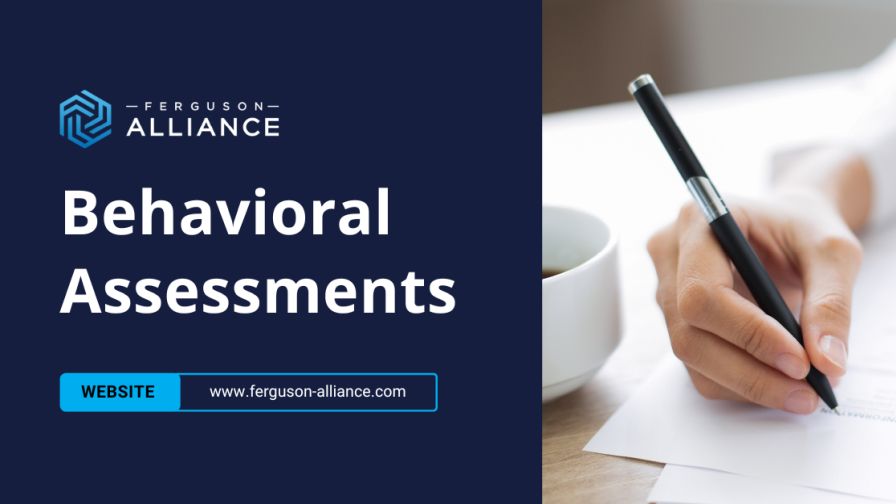
“Unlocking Team Potential with Behavioral Assessments” header | Ferguson Alliance
It’s no secret that effective team dynamics are crucial for an organization’s success. However, we’ve found that many family businesses struggle with internal disagreements and miscommunication. So, let’s explore how behavioral assessments can be your secret sauce for team building.
What is a Behavioral Assessment?
A behavioral assessment is any type of instrument that helps you, as a leader in your organization, better understand what people are great at and how you might deploy that greatness. It helps identify your team’s strengths, their motivations, and the way they approach their work.
For example, you might learn about your team’s default tendencies and some of their default behaviors when it comes to things like leadership, working collaboratively, the pace of work – and even their level of compliance. This level of knowledge then gives you insight into what kinds of roles people on your team are best at – plus, the kinds of roles and tasks that can make them feel fulfilled and purposeful.
When and How Is a Behavioral Assessment Helpful?
A behavioral assessment can be valuable in any situation in which a team wants to work together with better results. If team members are willing and able to become more self-aware and want to explore how to best employ their strengths, a behavioral assessment provides a strong foundation for that kind of discussion. Furthermore, it can help members of your team become more aware of the opportunities available to them.
Real-Life Application of Behavioral Assessments
I recently worked with a team of around a dozen members, who all took individual behavioral assessments. Then I sat down with each one of them, individually, to go over their results – and we had some really open and vulnerable discussions around what they felt their strengths were, what they felt their purpose was within the organization, and the opportunities they had to use more of their strengths for the good of the organization. It was a great way to have a completely safe discussion around the opportunities to shape their own leadership styles, along with areas of their work that were becoming a disadvantage to the organization.
Behavioral Assessment Tips
If you’re ready to engage in a behavioral assessment with your team, here are some tips to get you started:
Managing Fear and Misconceptions
Sometimes team members can be a little scared about what exactly you’re looking for, or how they’re being “tested.” Therefore, it’s important to be clear that there’s no right or wrong outcome from any assessment instrument. Instead, a behavioral assessment isn’t designed to identify who is or isn’t good at their job – it provides insight into behaviors team members exhibit and how they contribute to the value of the organization.
Promoting Team Buy-in
Make sure your team understands the purpose and benefits of the assessment. Clarity and alignment of expectations are key to gaining their buy-in. Explain how the insights gained will be used to enhance their work experience and improve team dynamics.
Generate and Maintain Momentum
One of the worst things you can do is administer a behavioral assessment, go over the results with your team once, and then never mention it again. Chances are your team will come out of their assessment feeling truly seen and heard, so it’s important to continue nurturing that feeling. Keep talking about the results of your assessment – and keep using the results to shape how you work with your team.
Building Team Culture with Behavior Assessments
By promoting self-awareness, improving communication, and creating a deeper understanding of individual behaviors, these assessments enhance team dynamics and productivity. When you implement them thoughtfully and consistently, they can transform the way teams work together, leading to a more cohesive and successful organization.
For additional information and an expanded look at the topic of team benefits available via behavioral assessments, make sure to read the original article on the Ferguson Alliance website.

